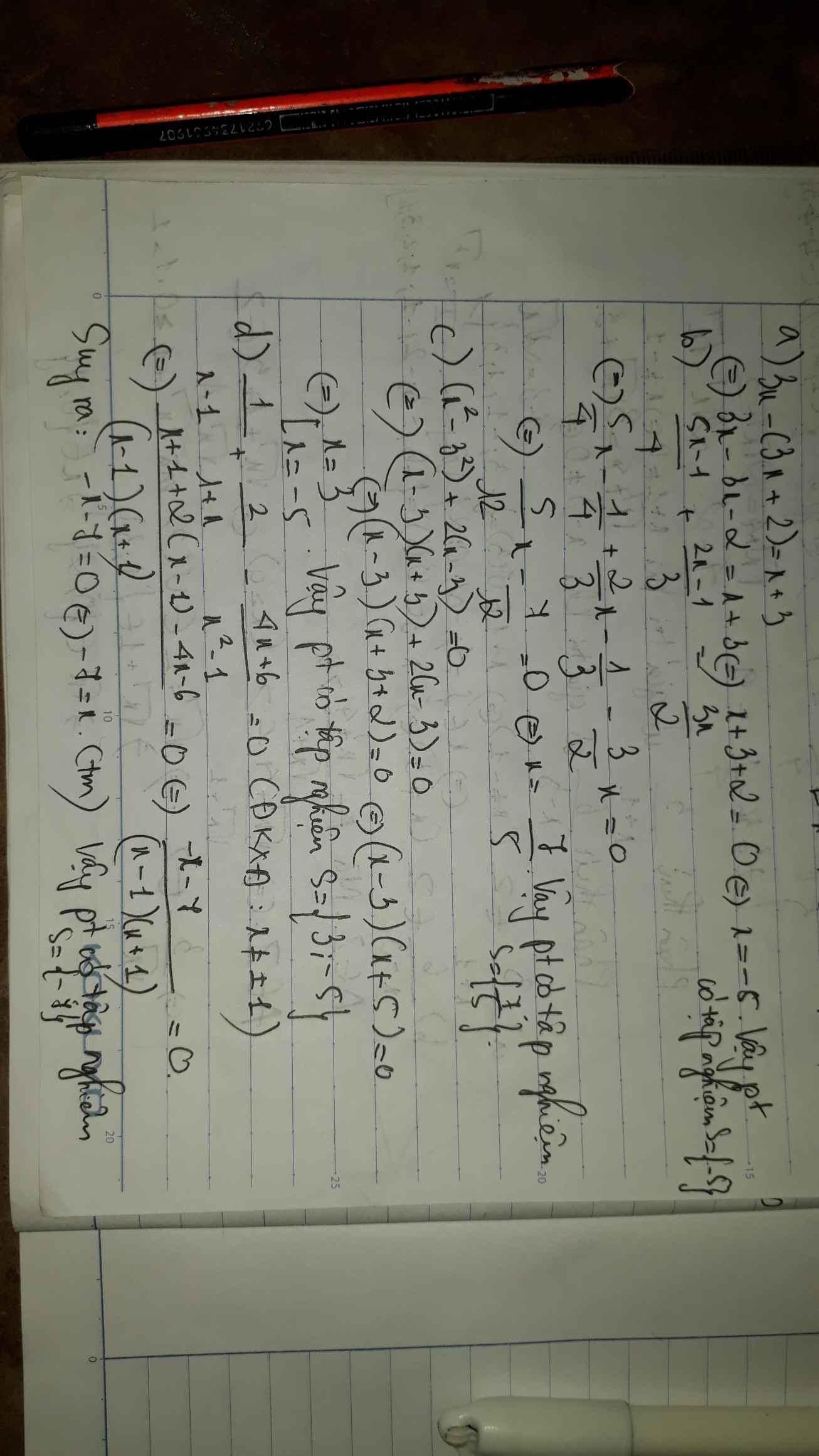Hãy nhập câu hỏi của bạn vào đây, nếu là tài khoản VIP, bạn sẽ được ưu tiên trả lời.

i,<=>(2x - 1)(2x - 1 + 2 - x) = 0 <=> (2x - 1)(x + 1) = 0
<=> x = 1/2 hoặc x = -1
j,<=>(x - 1)(5x + 3) - (3x - 5)(x - 1) = 0
<=>(x - 1)(2x + 8) = 0 <=> x = 1 hoặc x = -4
k,<=>4(x + 5)(x - 6) = 0 <=> (x + 5)(x - 6) = 0
<=> x = -5 hoặc x = 6
m,<=>x^2(x + 1) + x + 1 = 0
<=>(x^2 + 1)(x + 1) = 0 (1)
Mà x^2 + 1 > 0 với mọi x nên (1) xảy ra <=> x + 1 = 0
<=> x = -1

Câu 1:
a) \(x-\dfrac{5x+2}{6}=\dfrac{7-3x}{4}\)
\(\Leftrightarrow\dfrac{12x-2\left(5x+2\right)}{12}=\dfrac{3\left(7-3x\right)}{12}\)
\(\Leftrightarrow12x-10x-4=21-9x\)
\(\Leftrightarrow11x=25\)
\(\Leftrightarrow x=\dfrac{25}{11}\)
b) \(\left(3x-1\right)\left(x-3\right)\left(7-2x\right)=0\)
\(\Leftrightarrow\left[{}\begin{matrix}3x-1=0\Leftrightarrow x=\dfrac{1}{3}\\x-3=0\Leftrightarrow x=3\\7-2x=0\Leftrightarrow x=3,5\end{matrix}\right.\)
c) \(\left|3x\right|=4x+8\) (1)
Ta có: \(\left|3x\right|=3x\Leftrightarrow3x\ge0\Leftrightarrow x\ge0\)
\(\left|3x\right|=-3x\Leftrightarrow3x< 0\Leftrightarrow x< 0\)
Với \(x\ge0\), phương trình (1) có dạng:
\(3x=4x+8\Leftrightarrow-x=8\Leftrightarrow x=-8\)
(không thoả mãn điều kiện) \(\rightarrow\) loại
Với \(x< 0\), phương trình (1) có dạng:
\(-3x=4x+8\Leftrightarrow-7x=8\Leftrightarrow x=-\dfrac{8}{7}\)
(thoả mãn điều kiện) \(\rightarrow\) nhận
Vậy phương trình đã cho có 1 nghiệm \(x=-\dfrac{8}{7}\)
Câu 2:
\(2x\left(6x-1\right)\ge\left(3x-2\right)\left(4x+3\right)\)
\(\Leftrightarrow12x^2-2x\ge12x^2+9x-8x-6\)
\(\Leftrightarrow-3x\ge-6\)
\(\Leftrightarrow x\le2\)
Vậy bất phương trình đã cho có nghiệm \(x\le2\)

| 2-4x | = 4x-2
<=> \(\orbr{\begin{cases}\left|2-4x\right|=-2+4x=4x-2\\\left|2-4x\right|=2-4x=4x-2\end{cases}}\)
<=>\(\orbr{\begin{cases}-2+4x=4x-2\\2-4x=4x-2\end{cases}}\)
<=>\(\orbr{\begin{cases}-2+4x-4x+2=0\\2-4x-4x+2=0\end{cases}}\)
<=>\(\orbr{\begin{cases}0=0\\-8x+4=0\end{cases}}\)
<=> x=\(\frac{-4}{-8}=\frac{1}{2}\)
=> \(S=\left\{\frac{1}{2};\infty\right\}\)
2x-7> 3(x-1)
<=>2x-7>3x-3
<=>2x-3x>-3+7
<=>-x>4
<=>x<4
=>S={x/x<4}
1-2x<4(3x-2)
<=>1-2x<12x-8
<=>-2x-12x<-8-1
<=>-14x<-9
<=>x>\(\frac{9}{14}\)
=>S={\(\frac{9}{14}\)}
-3x+2|-4 -x|> 0
<=>\(\orbr{\begin{cases}-3x+2+4+x>0\\-3x+2-4x-x>0\end{cases}}\)
<=>\(\orbr{\begin{cases}-2x+6>0\\-8x+2>0\end{cases}}\)
<=>\(\orbr{\begin{cases}-2x>-6\\-8x>-2\end{cases}}\)
<=>\(\orbr{\begin{cases}x< 3\\x< \frac{1}{4}\end{cases}}\)
=>S={x/x<3;x/x<\(\frac{1}{4}\)}
4x-1|x-2|< 0
<=>\(\orbr{\begin{cases}4x-1-x+2< 0\\4x-1+x-2< 0\end{cases}}\)
<=>\(\orbr{\begin{cases}3x+1< 0\\3x-3< 0\end{cases}}\)
<=>\(\orbr{\begin{cases}3x< -1\\3x< 3\end{cases}}\)
<=>\(\orbr{\begin{cases}x< \frac{-1}{3}\\x< 1\end{cases}}\)
=>S={x/x<\(\frac{-1}{3}\);x/x<1}

a: Ta có: \(3x-\left(3x+2\right)=x+3\)
\(\Leftrightarrow x+3=-2\)
hay x=-5
b: Ta có: \(\dfrac{5x-1}{4}+\dfrac{2x-1}{3}=\dfrac{3x}{2}\)
\(\Leftrightarrow15x-3+8x-4=18x\)
\(\Leftrightarrow5x=7\)
hay \(x=\dfrac{7}{5}\)

1:
a: x^3+x^2-3x-3=0
=>x^2(x+1)-3(x+1)=0
=>(x+1)(x^2-3)=0
=>x=-1 hoặc x^2-3=0
=>\(S_1=\left\{-1;\sqrt{3};-\sqrt{3}\right\}\)
2x+3=1
=>2x=-2
=>x=-1
=>S2={-1}
=>Hai phương trình này không tương đương.
1: \(\dfrac{1}{\left|x+1\right|}+\dfrac{1}{x+2}=3\left(1\right)\)
TH1: x>-1
Pt sẽ là \(\dfrac{1}{x+1}+\dfrac{1}{x+2}=3\)
=>\(\dfrac{x+2+x+1}{\left(x+1\right)\left(x+2\right)}=3\)
=>3(x+1)(x+2)=2x+3
=>3x^2+9x+6-2x-3=0
=>3x^2+7x+3=0
=>\(\left[{}\begin{matrix}x=\dfrac{-7-\sqrt{13}}{6}\left(loại\right)\\x=\dfrac{-7+\sqrt{13}}{6}\left(nhận\right)\end{matrix}\right.\)
TH2: x<-1
Pt sẽ là:
\(\dfrac{-1}{x+1}+\dfrac{1}{x+2}=3\)
=>\(\dfrac{-x-2+x+1}{\left(x+1\right)\left(x+2\right)}=3\)
=>\(\dfrac{-1}{\left(x+1\right)\left(x+2\right)}=3\)
=>-1=3(x+1)(x+2)
=>3(x^2+3x+2)=-1
=>3x^2+9x+6+1=0
=>3x^2+9x+7=0
Δ=9^2-4*3*7
=81-84=-3<0
=>Phương trình vô nghiệm
Vậy: \(S_3=\left\{\dfrac{-7+\sqrt{13}}{6}\right\}\)
x^2+x=0
=>x(x+1)=0
=>x=0 hoặc x=-1
=>S4={0;-1}
=>S4<>S3
=>Hai phương trình này không tương đương

a: (3x-2)(4x+5)=0
=>3x-2=0 hoặc 4x+5=0
=>x=2/3 hoặc x=-5/4
b: (2,3x-6,9)(0,1x+2)=0
=>2,3x-6,9=0 hoặc 0,1x+2=0
=>x=3 hoặc x=-20
c: =>(x-3)(2x+5)=0
=>x-3=0 hoặc 2x+5=0
=>x=3 hoặc x=-5/2

a. (3x - 1)2 - (x + 3)2 = 0
\(\Leftrightarrow\left(3x-1+x+3\right)\left(3x-1-x-3\right)=0\)
\(\Leftrightarrow\left(4x+2\right)\left(2x-4\right)=0\)
\(\Leftrightarrow4x+2=0\) hoặc \(2x-4=0\)
1. \(4x+2=0\Leftrightarrow4x=-2\Leftrightarrow x=-\dfrac{1}{2}\)
2. \(2x-4=0\Leftrightarrow2x=4\Leftrightarrow x=2\)
S=\(\left\{-\dfrac{1}{2};2\right\}\)
b. \(x^3=\dfrac{x}{49}\)
\(\Leftrightarrow49x^3=x\)
\(\Leftrightarrow49x^3-x=0\)
\(\Leftrightarrow x\left(49x^2-1\right)=0\)
\(\Leftrightarrow x\left(7x+1\right)\left(7x-1\right)=0\)
\(\Leftrightarrow x=0\) hoặc \(7x+1=0\) hoặc \(7x-1=0\)
1. x=0
2. \(7x+1=0\Leftrightarrow7x=-1\Leftrightarrow x=-\dfrac{1}{7}\)
3. \(7x-1=0\Leftrightarrow7x=1\Leftrightarrow x=\dfrac{1}{7}\)

1) Ta có: \(x^2-4x+4=0\)
\(\Leftrightarrow\left(x-2\right)^2=0\)
\(\Leftrightarrow x-2=0\)
hay x=2
Vậy: S={2}

a) \(2x-6=0\)
\(\Leftrightarrow2x=6\)
\(\Leftrightarrow x=\dfrac{6}{2}=3\)
b) \(x^2-4x=0\)
\(\Leftrightarrow x\left(x-4\right)=0\)
\(\Leftrightarrow\left\{{}\begin{matrix}x=0\\x-4=0\end{matrix}\right.\)
\(\Leftrightarrow\left\{{}\begin{matrix}x=0\\x=4\end{matrix}\right.\)

a) \(x^2-4x+3>0\)
\(\Leftrightarrow x^2-x-3x+3>0\)
\(\Leftrightarrow x\left(x-1\right)-3\left(x-1\right)>0\)
\(\Leftrightarrow\left(x-3\right)\left(x-1\right)>0\)
Lập bảng xét dấu :
Dựa vào bảng xét dấu ta có : \(x< 1\) hoặc \(x>3\)
b) \(x^2-2x+3x-6< 0\)
\(\Leftrightarrow\left(x^2-2x\right)+\left(3x-6\right)< 0\)
\(\Leftrightarrow x\left(x-2\right)+3\left(x-2\right)< 0\)
\(\Leftrightarrow\left(x+3\right)\left(x-2\right)< 0\)
Lập bảng xét dấu :
Dựa vào bảng xét dấu ta có : \(-3< x< 2\)
phần b bn sai đề zui